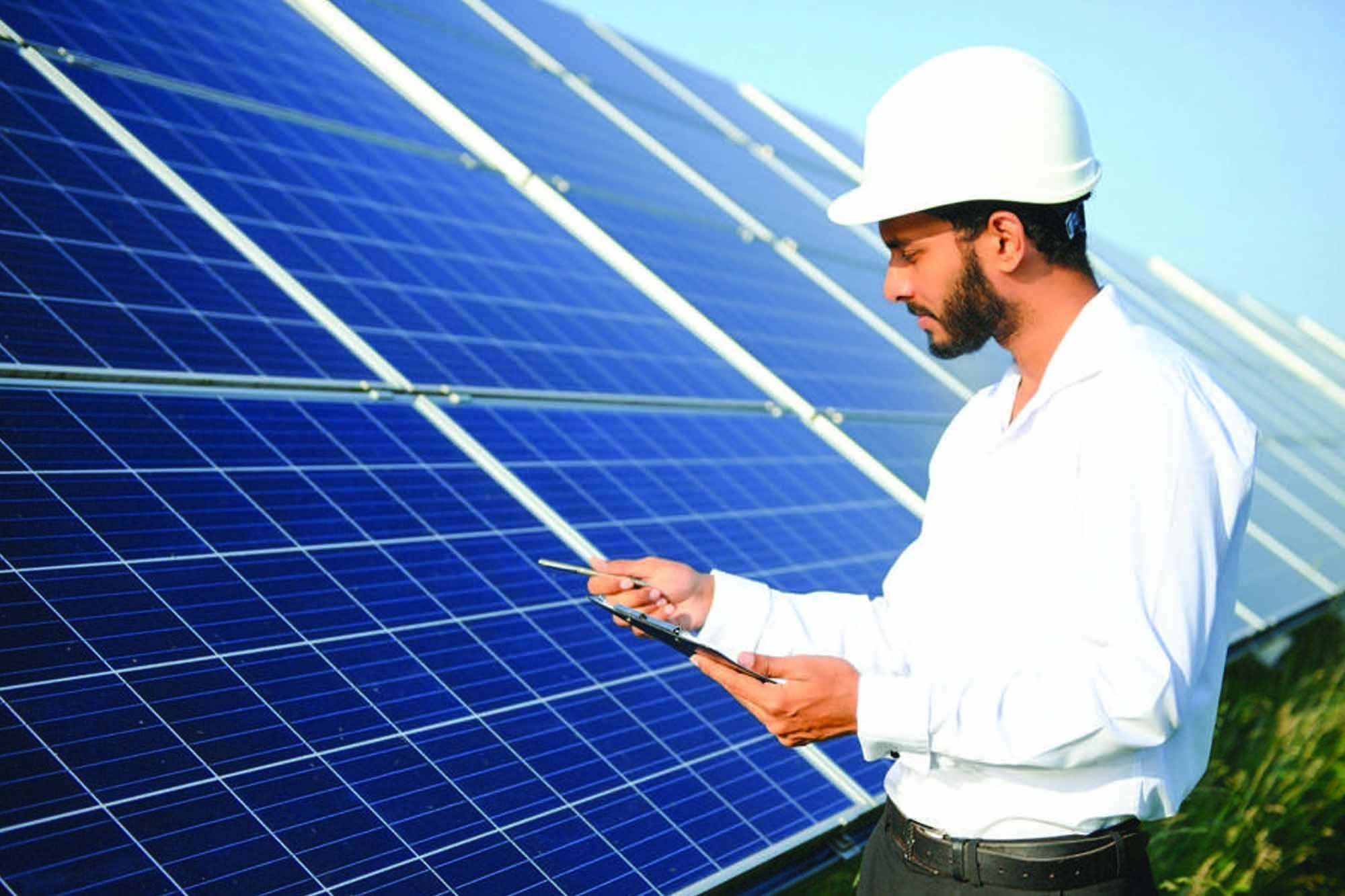India is swiftly advancing to clean energy goals
By EPR Magazine Editorial January 23, 2024 11:37 am IST
By EPR Magazine Editorial January 23, 2024 11:37 am IST

The growing awareness of environmental sustainability and the pursuit of cleaner alternatives have attracted substantial financial inflows, driving innovation.
In India’s dynamic renewable energy sector, key players strategically align with substantial investments, adeptly manoeuvring government initiatives, capitalising on subsidies, and embracing innovative technologies. Industry leaders are proactively enhancing their role in achieving sustainable energy goals amidst shifting market trends and challenges. With a focus on navigating the evolving landscape, these industrialists position themselves strategically to harness opportunities and drive progress in the nation’s renewable energy transition.
Investment influx
In recent years, the power sector in India has witnessed a significant surge in investment, with a pronounced focus on renewable energy sources. The growing awareness of environmental sustainability and the pursuit of cleaner alternatives have attracted substantial financial inflows, driving innovation. The industry leaders have geared up to tap the opportunity, ultimately contributing to the clean energy goals.
Avinash Hiranandani, Vice Chairman and Managing Director, Renewsys India said that investment in the power sector is creating demand. He says, “We are India’s first integrated solar company offering Encapsulants and Backsheets, which are key components for manufacturing solar panels. Any influx of capital into the country ultimately translates into higher demand for our products.”
Sumit Mehta, Co-founder and Director of PIXON, says that PIXON is poised to capitalise on the recent substantial investment influx in the power sector, particularly in renewable energy. He says, “Our 1 GW solar module manufacturing facility, now fully automated, has expanded from 400 MW, thanks to additional funding. This has enabled us to enhance production efficiency, scale further, and invest significantly in research and development. The focus on innovation aims to make solar energy more efficient, reliable, and cost-effective, expanding market reach globally.”
Anurag Garg, CEO- Solar Modules & Products Jakson Solar, opines that the recent surge in investments in the power sector is a pivotal moment for Jakson Group, a renewable energy and solar PV modules specialist. These funds present an invaluable opportunity to bolster our standing in the industry. He says, “By amplifying manufacturing capacity, investing in R&D for solar PV and green hydrogen technologies, and expanding into new markets, we aim to capitalise on the growing demand for clean energy solutions.”
He further says that diversifying into green hydrogen further positions Jakson at the forefront of transformative energy trends. Emphasis on supply chain efficiency and sustainability initiatives align with the company’s commitment to a greener future. “This influx of capital propels our growth, innovation, and leadership in the renewable energy sector while optimising production processes to offer cost-effective solutions on a larger scale,” he adds.
Rohit Tikku, CEO of Bluebird Solar, emphasises that Bluebird Solar is leveraging the significant influx of investments in the power sector to capitalise on emerging opportunities and solidify its role as a key player in the renewable energy landscape. He says, “The company plans to expand its production capacity to 1.2 GW by March 2024 and 2 GW by the end of FY 2024-25, catering to the growing market demand for its innovative solar panels.”
He further says that with newfound financial strength, Bluebird Solar is set to explore and penetrate new markets on a global scale, contributing to revenue growth and influence in the global renewable energy market. The company’s commitment to sustainability aligns with its commitment to eco-friendly practices, enhancing its brand reputation in the industry.

Government initiatives
The government has implemented various initiatives to boost the renewable energy sector to achieve sustainable development and address environmental concerns. Key measures have positively affected it, including the Grid Connected Solar Rooftop Programme and the National Solar Park Scheme.
Sumit Mehta emphasises that government subsidies, like the Grid Connected Solar Rooftop Programme, and tax benefits, such as reduced GST, profoundly impact the renewable energy industry, particularly PIXON’s performance. These incentives make solar energy solutions more affordable and accessible to a broader market, driving demand for solar modules and EVA Film.
He says, “For PIXON, this results in increased sales and market penetration. These government initiatives help create a more favourable business environment, reduce operational costs, and enhance profitability, which is crucial for sustaining our rapid growth and continuing our contribution to sustainable energy practices.”
Rohit Tikku states that government subsidies and tax benefits significantly influence the solar industry. It promotes solar adoption, boosts manufacturing and employment, stimulates technology innovation, and encourages sustainable practices. He says, “Initiatives like the Grid Connected Solar Rooftop Programme stimulate residential installations, while tax benefits make solar solutions more accessible. These incentives also stimulate manufacturing growth, job creation, and environmental benefits.” He further says a stable policy environment, including consistent subsidies and tax benefits, provides confidence for long-term planning and investment in the solar industry, attracting manufacturers and investors.
Kannan Krishnan, Joint Managing Director, Jakson Green, says that they are building a 1GW solar park, which will soon host assets contracted to supply for leading central government agencies under the aegis of the National Solar Park Scheme. He says, “In the immediate future, we aim to transition into building wind-solar hybrids, thereby contributing our bit to the national wind-solar hybrid policy as well, on our way to becoming one of the country’s leading utility-scale energy transition platforms.”
Manish Kumar, Chief Marketing Officer- Distributed Energy Business Jakson Limited, says that the recent adjustments in subsidies for rooftop solar units by the Ministry of New and Renewable Energy (MNRE) are indeed poised to play a significant role in boosting the implementation of rooftop solar units in India. He says, “Government subsidies and tax benefits, such as the Grid Connected Solar Rooftop Programme, have a notably positive impact on the renewable energy industry, particularly on companies like ours in the solar sector.”
Innovative technologies and challengesIn recent days, the renewable energy sector has witnessed a surge in innovative technologies that promise to reshape the future of sustainable energy. Advanced photovoltaic materials, such as perovskite solar cells, enhance solar panels’ efficiency while floating solar farms capitalise on untapped water surfaces.
Energy storage solutions, including next-gen batteries and advanced grid systems, address the intermittent nature of renewables. However, challenges persist, ranging from the intermittency of renewable sources to the need for robust infrastructure. Additionally, integrating decentralised energy systems and navigating regulatory frameworks pose hurdles. Overcoming these challenges is crucial for unlocking the full potential of renewable energy and achieving a cleaner energy future.
Avinash Hiranandani comments that Renewsys has transitioned from Poly to PERC and subsequently from PERC to TOPCon, reflecting the company’s commitment to adopting cutting-edge technologies. He says, “We believe that PERC will remain in the market for at least another year, with TOPCon eventually taking over. We have consistently upgraded our production lines with the latest technological trends. We will continue to invest in advancements that align with evolving market demands, ensuring the continued satisfaction of our customers.”
Sumit Mehta states that PIXON leads the solar industry with its 1 GW manufacturing of Solar Modules and EVA Film, employing advanced materials and processes for heightened efficiency and durability. He says, “The introduction of the Multibusbar Modules, including M6, M10, and M12 bifacial series, showcases capacities ranging from 420 Wp to 600 Wp with an impressive 21.29 percent efficiency.” He further says that navigating challenges in a dynamic market demands continuous R&D to adapt to technological shifts, competition, and changing regulations. “PIXON remains committed to innovation, investing in R&D, and staying agile to meet evolving customer preferences. By doing so, PIXON aims to ensure widespread access to efficient renewable energy, aligning with its vision to transform the energy landscape,” he adds.
Anurag Garg remarks that Jackson has been at the forefront of introducing cutting-edge solar energy technology, exemplified by the investment in manufacturing PV modules using the latest N-type TopCon cell technology. “These modules offer superior efficiency with reduced sensitivity to impurities and extended carrier lifetimes. Also, they exhibit lower Light-Induced Degradation (LID), ensuring enhanced long-term performance,” he says.
He further says that N-type cells, often combined with PERC technology, feature a passivation layer to minimise recombination losses. Despite these advantages, challenges include potentially higher manufacturing costs due to complex processes and the need to address industry-wide adoption barriers. “In the dynamic landscape of PV module technology, ongoing advancements aim to improve efficiency, durability, and cost-effectiveness, necessitating manufacturers to navigate challenges for successful implementation,” he adds.
Rohit Tikku comments that the company is enhancing the efficiency and performance of solar panels by incorporating cutting-edge technologies, including half-cut and bifacial panels. He says, “We are expanding our fully automated AI-enabled manufacturing capacities to cross the Gw production scale. The future plans include introducing advanced N-type TOPCon and HJT modules and a commitment to cross 2GW by the end of 2025 to get backwards integrated into the solar PV module manufacturing value chain.”
He further explains that Indian solar panel manufacturers face challenges due to evolving technologies like TOPCon and HJT. Bluebird Solar invests in research and development, technological advancements, and continuous training programmes. The company plans to expand manufacturing capabilities to meet the increased demand for advanced solar technologies, ensuring long-term scalability.
All the stakeholders, including the government and private entities in the renewable energy sector, must work in coordination to reach the clean energy goals. Investment in the right direction and policies to accelerate energy growth are necessary. This, in the end, will catalyse the achievement of energy security for the world’s most populous nation.
Quotes:
Avinash Hiranandani, Vice Chairman and Managing Director- Renewsys India Pvt Ltd.-
“We believe that PERC will remain in the market for at least another year, with TOPCon eventually taking over.”
Sumit Mehta, Co-founder and Director, PIXON-
“Our 1 GW solar module manufacturing facility, now fully automated, has expanded from 400 MW, thanks to additional funding.”
Rohit Tikku, CEO, Bluebird Solar-
“Initiatives like the Grid Connected Solar Rooftop Programme stimulate residential installations, while tax benefits make solar solutions more accessible.”
We use cookies to personalize your experience. By continuing to visit this website you agree to our Terms & Conditions, Privacy Policy and Cookie Policy.